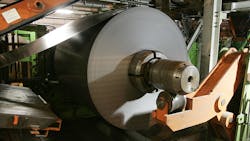Big Quarterly Profit for World's Biggest Steelmaker
ArcelorMittal reported its highest quarterly profit since 2014 on the back of a recovery in steel prices.
Earnings before interest, taxes, depreciation and amortization in the three months ended June 30 rose to $1.77 billion from $1.4 billion a year earlier, the Luxembourg-based company said in a statement Friday. That beat the $1.51 billion average of 12 analyst estimates compiled by Bloomberg. The shares jumped to the highest in 11 months.
Steelmakers’ earnings have been boosted by an increase in material prices as China’s economy stabilized and policy makers around the world pledged to back growth. European prices jumped 13% in the quarter, while iron ore, which ArcelorMittal also mines, rose to the highest in more than a year.
“Although the industry continues to face the challenges of structural overcapacity, we are seeing better market conditions compared with the second half of 2015, which lead us to be cautiously optimistic about the remainder of the year,” CEO Lakshmi Mittal said in the statement.
ArcelorMittal shares gained as much as 5.2% to 5.73 euros and were at 5.67 euros by 10:05 a.m. in Amsterdam. The company maintained its estimate for full-year Ebitda to exceed $4.5 billion. Ebitda in the first half was $2.7 billion. Citigroup estimates the full-year figure at $5.5 billion.
Top supplier China is still exporting record amounts of material, undercutting prices in Europe and the U.S. ArcelorMittal was forced to raise $3 billion from investors earlier this year as it sought to weather the crisis and cut debt.
The company, which supplied steel for New York’s One World Trade Center and London’s Wembley Stadium, has also scrapped its dividend, cut expansion plans and shuttered plants. Net debt dropped to $12.7 billion, down from $17.3 billion on March 31, and will fall further in the second half, Chief Financial Officer Aditya Mittal said on a conference call.
The net debt-to-Ebitda ratio will decline to about 2 by year-end, the level at which ArcelorMittal has said it will consider restarting dividend payments, Citigroup estimates. The ratio was at 2.5 by the end of the second quarter.
“Despite the steel-spread recovery losing momentum in recent weeks, the impact of lagged prices will be an important support for operating results as we move into a period of seasonally slower steel demand,” the company said.
The direct impact of the U.K.’s vote to exit the European Union is “very limited,” Aditya Mittal said.
By Jesse Riseborough and Thomas Biesheuvel
About the Author
Bloomberg
Licensed content from Bloomberg, copyright 2016.
